Sixties
City presents
a wide-ranging series of
articles on all aspects of the Sixties, penned by the creator of the iconic
60s music paper Mersey
Beat
|
Sixties
City presents
a wide-ranging series of
articles on all aspects of the Sixties, penned by the creator of the iconic
60s music paper Mersey
Beat
|
|||||
|
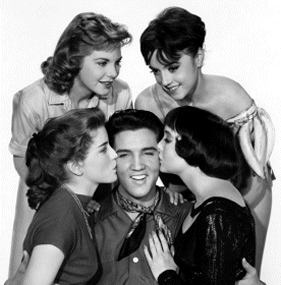 |
Elvis’
fourth film was a 1958 Paramount movie, 116 minutes in length, that opened
nationally in America on 2nd July as a double bill with the western, ‘Bullwhip.’
The film was based on the Harold Robbins novel ‘A Stone For Danny Fisher’
and when Hal B. Wallis bought the movie rights it was rumoured that it was
to be a non-musical film with James Dean. Wallis was also said to have considered
Ben Gazarra taking the starring role. When Elvis was cast in the movie,
it was due to start filming in January 1958. $350,000 worth of pre-production work had already been done when, on 20th December 1957, Elvis received his call-up papers and was due to report for military service in one month’s time. With the film now in jeopardy, the head of Paramount Studios requested a deferment but was told that Elvis himself must apply. Elvis was reluctant and said, “I don’t want to try and get extra time. People will think it's all wrong.” However, he did write to the draft board on 24th December and was given a 60-day deferment. He arrived in Hollywood on 13th January and began recording sessions at Radio Recorders studios prior to the filming. Elvis and his friends rented a nine-room penthouse suite at the Beverly Wiltshire hotel. At the time he told a reporter, “I’m a prisoner of my tonsils. I guess my fans would expect me to sing no matter what. I want to be more than a singer. I’d have a longer future as an actor, I’m sure. I won’t ever stop singing but there’s no reason I can’t do both, like Bing Crosby and Frank Sinatra have done. I think they both improved as singers after they went in for acting”. Elvis and his entourage then moved to the Roosevelt Hotel in New Orleans, where location filming was to take place, and took over the entire tenth floor. Instructions were given that no one but Elvis and his party were to be allowed to leave the elevator on that floor, an instruction supported by a security guard. One day, when Elvis entered the elevator, the guard refused to believe he was Elvis and the singer had to alight at the eleventh floor and walk down. Incidentally, this was the first Elvis film to be made on location. The director was Michael Curtiz of ‘Casablanca’ fame. Initially, Curtiz wasn’t too pleased at having Elvis as his star, but Wallis told him, “You can give Presley the thing he wants most. What the boy wants more than anything in the whole world is the respect of older people.” When Curtiz instructed Elvis to cut his hair and get rid of the sideboards, also to lose some weight, Elvis said “You’re the boss, Mr Curtiz.” He was also to observe, “For the first time in my career I’m playing somebody other than Elvis Presley. I don’t think the boy in the story would wear sideburns so I had them cut off”. He also lost 15lbs in weight, saying, “If you’re the least bit heavy, movie cameras make you look chubby”. In the Robbins book Fisher was a boxer, not a singer, and the setting was in New York City. Among titles considered for the movie were ‘Danny’ and ‘Sing, You Sinners’, but it was decided to call it ‘King Creole’ after the name of a nightclub in the movie and it was decided to change the location from New York City to New Orleans because of Elvis’ Southern accent. |
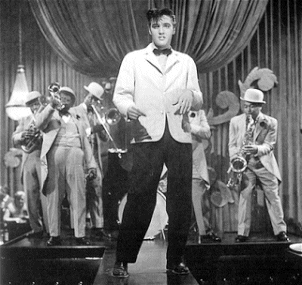 |
When Danny is late for school one day he gets into fight and is then told
he won’t graduate. In fact, Danny has failed at High School twice and says,
“If this keeps up much longer, I’ll be a freshman again.” He drops out of
High School, having to support his father, but is short of money and when
asked by a young punk called Shark if he’d like to join his gang, he agrees.
This brings him into trouble with the law as Shark gets him to sing in a
store as a distraction while the gang shoplift. Danny meets a young girl
there, Nellie, who becomes his sweetheart. However he is caught by the cops for stealing, but is saved from a jail term by New Orleans saloon keeper Charlie Le Grand who gives him a job as a singer in his Bourbon Street club, King Creole, at $85 a week. He is so successful at the club, drawing in the crowds, that Maxie Field, who runs the Gilded Cage, forces him to sing at his club. Danny is attracted to Maxie’s girlfriend Ronnie, who returns his affections. In the meantime, Danny’s father has found himself a job in a drug store. Field is annoyed with Danny and gets Shark to beat up Danny’s father, who is taken to hospital. A furious Danny beats Maxie up, then runs away with Ronnie seeking a safe refuge, but is pursued by Maxie and his hoods. Maxie kills Ronnie and is then killed by his own men. Danny returns to the King Creole and Nellie. There were 11 songs in the movie, beginning with ‘Crawfish’, which was sung in a duet with Kitty White. ‘Steadfast, Loyal and True,’ which was the school song of Royal High School, was sung in the nightclub the Gilded Cage. Elvis sang ‘Lover Doll’ in a department store while his friends indulged in some shoplifting. ‘Trouble’ was another song sung on stage at the Gilded Cage. All the other songs were sung at the King Creole nightclub – ‘Dixieland Rock’, ‘Young Dreams’, ‘New Orleans’, ‘Hard Headed Woman’, ‘King Creole’, ‘Don’t Ask Me Why’ and ‘As Long As I Have You’. Jerry Leiber and Mike Stoller wrote ‘King Creole’; ‘Crawfish’ was written by Fred Wise and Ben Weisman; ‘Steadfast Loyal And True’ was by Jerry Leiber and Mike Stoller; ‘Lover Doll’ by Sid Wayne and Abner Silver; ‘Trouble’ by Jerry Leiber and Mike Stoller; ‘Dixieland Rock’ by Aaron Schroeder and R. Frank; ‘Young Dreams’ by Aaron Schroeder and Martin Kalmanoff; ‘New Orleans’ by Sid Tepper and Roy C. Bennett; ‘Don’t Ask Me Why’ by Fred Wise and Ben Weisman was issued as a single, but only reached No.28 and ‘As Long As I Have You’ was also written by Wise and Weisman. ‘Hard Headed Woman’, the single of which reached No.2 in the American charts and became the first Elvis record played on Radio One in England, was by Claude DeMetrius. |
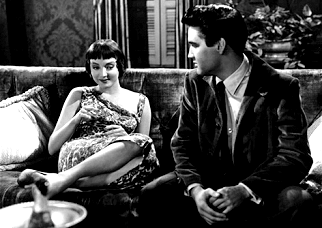 |
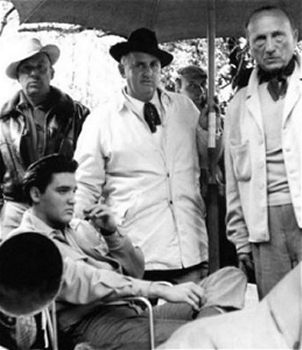 |
The ‘King Creole’ EP was issued on RCA EPA 4319 in July 1958 and topped
the EP chart for 29 weeks with sales exceeding one million copies. Side
One: King Creole, New Orleans. Side Two As Long as I Have You, Lover Doll.
The ‘King Creole EP Volume 2’ was issued on. RCA EPA 4321 in August 1958 and was No.1 for one week and No.2 for 17 weeks. Side One: Trouble, Young Dreams. Side Two: Crawfiosh, Dixieland Rock. The ‘King Creole’ album was issued on RCA LMP 1884 in August 1958 with a bonus: a black and white photo of Elvis in army uniform (right). The album reached No.2 in the charts and contained all 11 movie songs. On returning to Memphis, Elvis was to tell the local newspapers, “King Creole is my best picture yet as far as the script is concerned. It was quite a challenge for me because it was written for a more experienced actor” and “In other pictures, I felt like a singer trying to be a ham. But in this one I’m not uncomfortable. I enjoyed it. I felt that I was really acting.” The reviews were kind: Billboard wrote “Elvis’ best acting performance to date.” The New York Times reported: “Presley can act” while Variety stated: “Presley shows himself to be a surprisingly sympathetic and believable actor on occasion”. The magazine 'Film Threat' commented: “His Danny Fisher is brave, angry and will under no circumstances ever back down. He glides and dances his way through the movie like it was a ballet”. Also see Sixties City pages: Elvis Films |
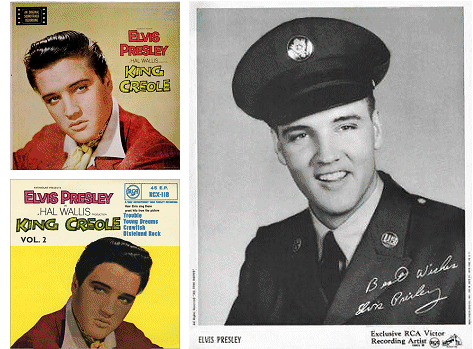 |
|
Article
Text
UK
web hosting by
|